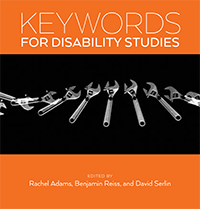K eywords for Disability Studies
eywords for Disability Studies
Keywords for Disability Studies aims to broaden and define the conceptual framework of disability studies for readers and practitioners in the field and beyond. The volume engages some of the most pressing debates of our time, such as prenatal testing, euthanasia, accessibility in public transportation and the workplace, post-traumatic stress, and questions about the beginning and end of life.
Each of the 60 essays in Keywords for Disability Studies focuses on a distinct critical concept, including “ethics,” “medicalization,” “performance,” “reproduction,” “identity,” and “stigma,” among others. Although the essays recognize that “disability” is often used as an umbrella term, the contributors to the volume avoid treating individual disabilities as keywords, and instead interrogate concepts that encompass different components of the social and bodily experience of disability. The essays approach disability as an embodied condition, a mutable historical phenomenon, and a social, political, and cultural identity.
An invaluable resource for students and scholars alike, Keywords for Disability Studies brings the debates that have often remained internal to disability studies into a wider field of critical discourse, providing opportunities for fresh theoretical considerations of the field’s core presuppositions through a variety of disciplinary perspectives.
“”Keywords for Disability Studies deftly demonstrates how disability may act as a conjuncture (like race) that opens cultural studies to new and crucial means of making sense of economic and cultural contexts, and deploying that knowledge politically. Its interdisciplinarity, broad-ranging perspectives, and deeply enacted connection to material politics ought to make this an exciting and illuminating read for those interested in cultural studies, disability, or both. In this intersection, there is the potential for the best kind of acculturation, a mutually transformative and progressive growth.”
–Elizabeth Elcessor, Assistant Professor of Communication and Culture, Indiana University


 eywords for Disability Studies
eywords for Disability Studies